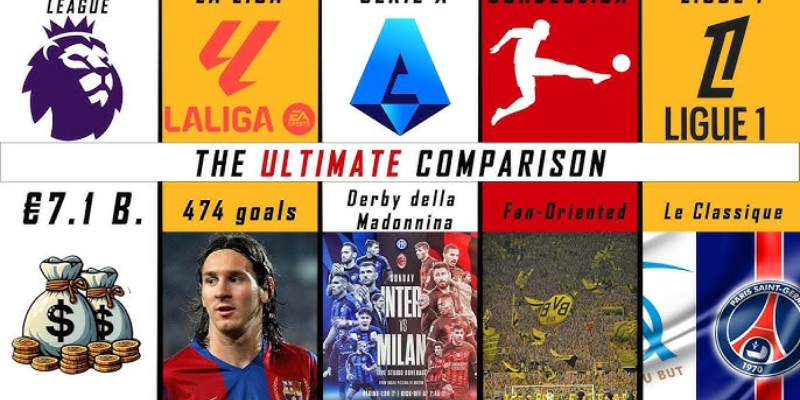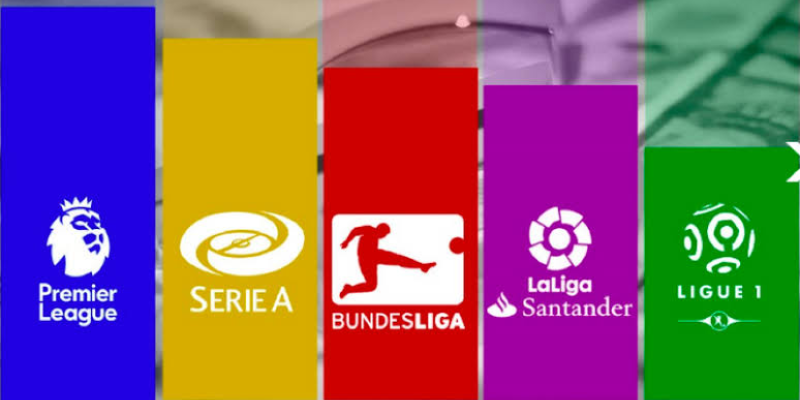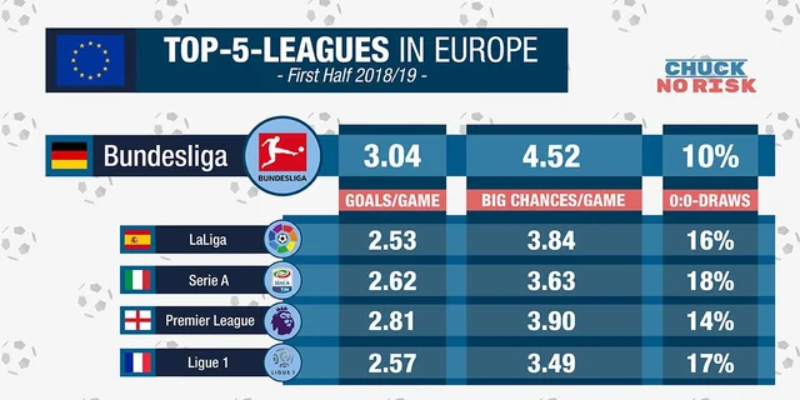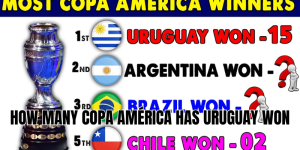From the first whistle: is Ligue 1 better than Bundesliga? The short answer—no, not definitively—but it depends heavily on what “better” means. Strengths differ, and each league shines in its own ways. In this article, JeansPitch will guide you through a deep, comparative dive into quality, competitiveness, finances, fan culture, European performance, and more—so you can decide what “better” means for you as a fan.
What makes a league “better”

Before comparing, we need criteria. What do people usually mean by “better”? Key metrics include:
- Competitiveness: How many teams compete realistically for the title / European places? How close are matches?
- Player quality & exports: Stars, depth, youth development, export to bigger clubs.
- European results: How clubs fare in Champions League, Europa League.
- Financial strength: Revenue, media rights, wages.
- Fan support & attendance: Stadiums, matchday experience.
- Style of play & entertainment: Goals, tactics, drama.
We’ll visit each of these, comparing Ligue 1 (France) and the Bundesliga (Germany) using recent data where possible.
Head-to-head: Strengths & Weaknesses

Below are the major areas where Bundesliga and Ligue 1 compare, with what each does well, and where they lag.
Competitiveness
Bundesliga
- Bundesliga has 18 teams (vs 20 in many other leagues), which can concentrate quality somewhat and reduce fixture congestion.
- While Bayern Munich often dominate, in recent seasons teams like Bayer Leverkusen and Borussia Dortmund have challenged strongly. In 2023-24, Leverkusen won their first ever Bundesliga title.
- Matches often produce upsets; mid-table clubs frequently take points off giants. Depth beyond the top few is solid.
Ligue 1
- Dominance of PSG has been pronounced historically—many seasons PSG run away with the title. In 2024-25, PSG won their 13th league title, securing it well in advance.
- Beyond PSG, there is fluctuation for places in European qualification, but for the title, less real competition compared to Bundesliga.
Verdict on competitiveness: Bundesliga is more competitive overall, especially at the top couple of places and for European spots.
Player Quality & Talent Development
Bundesliga
- Very strong youth development; clubs like Borussia Dortmund, Bayern, RB Leipzig frequently produce or attract top young talent.
- Big names (including recent transfers) perform well. The league attracts international stars but also emphasizes developing domestic and youth prospects.
Ligue 1
- France has a great reputation for producing top players (Mbappé, many others), exporting to bigger leagues.
- However, many stars depart early—before reaching peak—which sometimes reduces the “show” in Ligue 1 itself.
European Performance
Bundesliga
- German clubs regularly make deep runs. For example, in 2023-24, Bundesliga clubs contributed strongly to UEFA rankings.
- Bayern Munich remains a major power; other clubs occasionally reach latter stages in Champions League or Europa League.
Ligue 1
- PSG has been the main representative at late stages, but other French clubs often struggle to match up consistently in Europe.
- French clubs outside PSG have more difficulty progressing in Champions League knockout rounds.
Financial Strength & Revenue
Bundesliga
- Solid revenue base, good commercial deals, strong attendance which aids matchday income.
- Ticket prices tend to be more affordable; attendance numbers are high. The 2024-25 season saw average Bundesliga attendance around ~38,600-39,000, making it one of the top-attended leagues globally.
Ligue 1
- PSG has huge financial power, but beyond them the finances are more variable.
- Recently, Ligue 1 has had issues: declining broadcast rights revenue, economic pressure, and star players leaving.
Goals, Style, and Entertainment
Bundesliga
- Generally high-scoring; open games, dynamic attacking football. Recent Bayern season saw extreme goal outputs.
- Fans are passionate; stadiums are often full; atmosphere strong.
Ligue 1
- Some high scorelines too (especially when PSG involved), but less consistency in entertainment across the board.
- The disparity between top and bottom in Ligue 1 sometimes leads to less competitive matches.
Other Factors: Fan Culture, Attendance, Matchday Experience
Bundesliga
- German clubs have excellent average attendance and fan engagement. Many clubs have standing areas, chea.
- Stadion culture is a big part of Bundesliga identity.
Ligue 1
- Big clubs like PSG, Marseille, Lyon draw large crowds; but some smaller clubs have lower attendance, less infrastructural investment.
- Geography and finances sometimes limit matchday experience compared to German counterparts.
Recent Data: 2024-25 Season Comparisons

To bring things into sharp relief, here are some recent season stats that illustrate strengths:
- Goals and matches: In 2024-25, Bundesliga had 306 matches with 959 goals scored. Ligue 1 in the same season had also 306 matches but 911 goals.
- Top scorers: Bundesliga’s golden boots are high: Harry Kane scored 36 goals in 2023-24. Meanwhile in Ligue 1, top scorers are strong but fewer matches of big individual tallies outside of PSG stars.
- Attendance: Bundesliga averages ~38,600 spectators. Ligue 1’s average attendance is lower; major clubs draw big crowds but smaller ones often do not.
Where Ligue 1 Beats Bundesliga
It’s not all in favour of Germany. There are areas where Ligue 1 holds clear edges, or at least unique strengths.
- Big-club star power: PSG, especially with its superstar signings, gives Ligue 1 a marquee appeal internationally. When big names play (Mbappé, formerly Neymar/Messi etc.), global attention follows.
- Youth pipeline & scouting: France is a hotbed for young talent; many world-class players begin in Ligue 1 academies and systems.
- Cost of players / value deals: For clubs outside of PSG, there are more opportunities to sign hidden gems or talents.
- Style variations: Some Ligue 1 matches have a different tactical slant: less intense pressing at times, perhaps more focus on individual flair in certain teams; some fans prefer that variation over the fast tempo/tactical rigidity seen in parts of Bundesliga.
So, Is Ligue 1 Better Than Bundesliga?
Now, summing up: Bundesliga generally outperforms Ligue 1 on more metrics, especially when judged by consistency, competitiveness beyond the top club, attendance, matchday culture, and European performance. That said, Ligue 1 is not far behind in certain areas—star power, youth production, and occasionally dramatic flair.
If “better” means:
- more exciting, high-scoring games → Bundesliga probably wins
- consistent quality across whole league (not just top 2 or 3) → Bundesliga
- exposure to superstar signings, flashy matches, young emerging talents → Ligue 1 has strong advantages
So, for many observers, the logical conclusion is that Bundesliga is the stronger league overall in the current era—but Ligue 1 has its own merits and remains essential in the European football ecosystem.
What Could Shift the Balance
JeansPitch believes the gap could either widen or narrow depending on:
- Broadcast revenue deals in France: If Ligue 1 handles its rights and finances better, that could increase club investments and reduce the dominance gap.
- Retention of talent: If bigger clubs/leagues stop poaching Ligue 1 stars as early, French league depth could improve.
- European successes: If more Ligue 1 clubs (beyond PSG) regularly go deep in Europe, that increases the league’s ranking, prestige, and attractiveness.
- Infrastructure and fan engagement: Upgrading stadia, improving matchday experiences, boosting audience engagement could increase Ligue 1’s domestic and international appeal.
Conclusion
In this article, JeansPitch concludes that Bundesliga is generally better than Ligue 1 across most of the standard metrics: competitiveness, attendance, consistency, European results. But “better” isn’t absolute—for fans who care about star power, potential bargains, or the romance of rising talent, Ligue 1 still has a lot to offer.
If you want, I can also pull up player-by-player comparisons, club by club, or predictions for if Ligue 1 might overtake Bundesliga in the next 5‐10 years. Let me know what you prefer!






